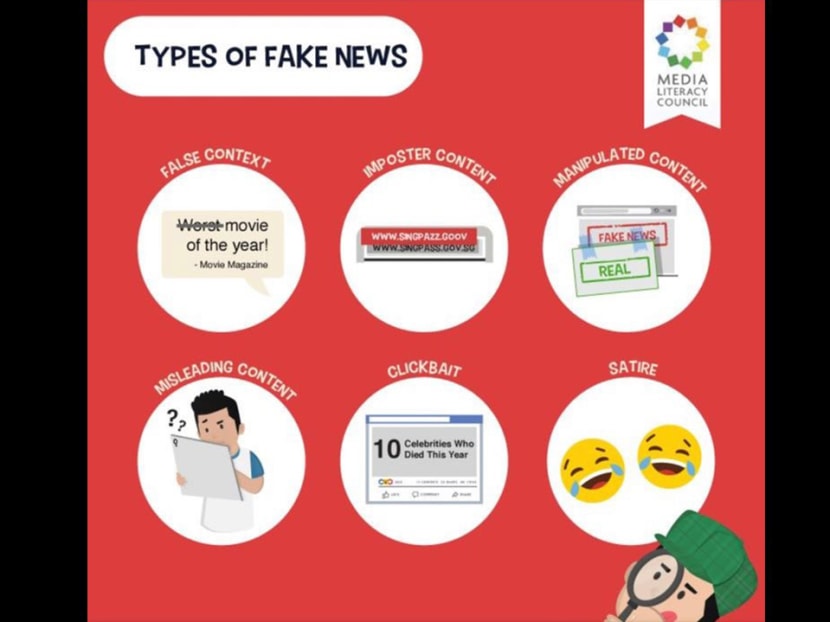Media Literacy Council apologises for graphic describing satire as fake news
SINGAPORE — The Media Literacy Council (MLC) has apologised for a Facebook post with a graphic which described satire as a type of fake news, after netizens pointed out that the graphic was fake news in itself.

The graphic was posted by the Media Literacy Council last Thursday and showed six different types of fake news: False context, imposter content, manipulated content, misleading content, clickbait and satire.
SINGAPORE — The Media Literacy Council (MLC) has apologised for a Facebook post with a graphic which described satire as a type of fake news, after netizens pointed out that the graphic was fake news in itself.
“We acknowledge that the post and infographic gave the wrong impression that satire was fake news, which was not the intent. We are sorry for the confusion and will review our material,” it said in a Facebook post on Sunday (Sept 8).
“The aim of the post was to raise awareness among youths and the general public about the need to be aware of the ways in which misinformation or fake news can be spread, and encourage readers to understand the context in which information is presented. This is part of MLC's work to encourage online discernment.
“Thank you to the readers who brought this to our attention.”
Get TODAY's headlines delivered to your mobile device! Join our Telegram channel here:

The graphic was posted by MLC last Thursday and showed six different types of fake news: False context, imposter content, manipulated content, misleading content, clickbait and satire.
The post was taken down on Saturday.
Law and Home Affairs Minister K Shanmugam said earlier in May that the Protection from Online Falsehoods and Manipulation Act (Pofma) targets only false statements that distort facts and not opinions, criticisms, satire or parody.
Netizens immediately took issue with the categorisation of satire as fake news.
Associate Professor Leong Ching, dean-designate of students at the National University of Singapore, said in a public post on Facebook that “satire is NOT fake news. It is exempt from POFMA”.
“We do not expect perfection from our public agencies but we do expect them to behave in a certain way if they make mistakes. We all made mistakes — does the media literary council (sic) itself know how to behave when it makes a mistake online?”
The MLC was formed in 2012 to spearhead public education on media literacy and cyber wellness. It also advises the government on appropriate policy responses to the evolving world of media, technology and consumer participation.
Many netizens were not satisfied with the apology from MLC.
Facebook user Jacelyn Yap said in a comment on MLC’s apology on Facebook: “In the previous post you clearly listed Satire as fake news yet here you say that wasn't your intent. Was your intent to mislead people? Are you ok?”
Former journalist and NUS Associate Professor Bertha Henson, commenting on the same post, wrote: “I am disappointed at your suggestion that you merely gave the wrong impression — when you made a false statement.
“Your mistake — which I hope was an honest one — only confirms fears that satire will be seen as fake news — wittingly or unwittingly. If the MLC does not know the law well enough, how can it presume to educate others on it?”











